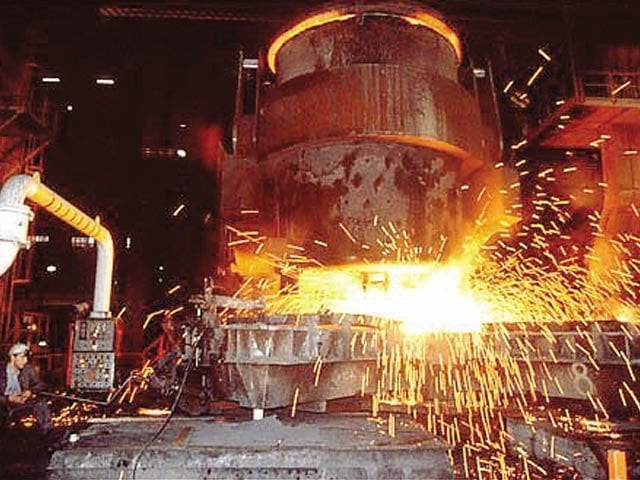Faced by Chinese import, PSM incurs heavy losses
Steel mill unable to compete with influx of import, bailouts prove to be useless

Steel mill unable to compete with influx of import, bailouts prove to be useless. PHOTO:FILE
While bail-outs have continued to inject some life into the sick unit, stiff competition in the form of Chinese steel has dented whatever hope it had of resurrecting.
Despite reducing its prices by 29% (excluding 17% general sales tax) since January 2015, the PSM has failed to compete with rampant import of Chinese steel that has grabbed a chunk of the market share.
Sindh has till January 21 to take or leave Pakistan Steel Mills
On average, Pakistan’s imports of hot-rolled coils (HRC) from China amounted to 150,000 to 175,000 tons per month since January 2015, which is more than three times the 50,000-ton monthly average in calendar year 2014.
In January last year, the government imposed 15% import duty on different steel products to protect the local industry. The list of products included billets, bars, and wire rods while 5% duty was also imposed on imported cold rolled coils (CRCs) and galvanised platted sheets. But the move did not help PSM because the list of products did not include HRC - the main product of PSM.
The imposition of 15% duty helped reduce Chinese imports in 2015m but the industry continues to demand more protection. It wants the government to slap at least 40% duty on imports.
On the other hand, the government imposed 12.5% duty on HRC products on March 19, 2015. PSM officials say the delay in imposing duty on HRC products helped importers in importing cheap Chinese steel in 2015. The competition forced PSM to reduce its prices of HRC products and hence it faced losses on its inventory.
China factor
Slow economic growth and low consumption of steel in China produced a glut of steel which forced Chinese exporters to massively reduce prices of HRC products for international buyers in 2015.
Sindh looks for more time to decide on PSM acquisition
PSM is at standstill since mid last year because of the non-availability of required gas pressure to run its plants. Meanwhile, its semi-finished products of approximately Rs6 billion which include slabs, metallurgical coke and iron ore also stand idle.
The Sindh government on Monday asked for more time to decide whether the provincial government is going to acquire PSM or not. The federal government gave a deadline of January 21 to the provincial government to decide about the acquisition.
After facing various setbacks and opposition from the Sindh government in privatising PSM, the federal government in October 2015 said the provincial government should acquire the mill if it is against its privatisation.
The federal government is under pressure from the IMF as both the troublesome cases of privatisation - Pakistan International Airlines (PIA) and PSM - are still unresolved mainly because of political differences.
The current management of PSM says that the mill is in a crisis because it can neither sell its finished nor semi-finished products. The ongoing gas supply and payment of dues problem between Sui Southern Gas Company (SSGC) and PSM is still unresolved making the matter more complicated for PSM.
Published in The Express Tribune, January 20th, 2016.
Like Business on Facebook, follow @TribuneBiz on Twitter to stay informed and join in the conversation.



















COMMENTS
Comments are moderated and generally will be posted if they are on-topic and not abusive.
For more information, please see our Comments FAQ